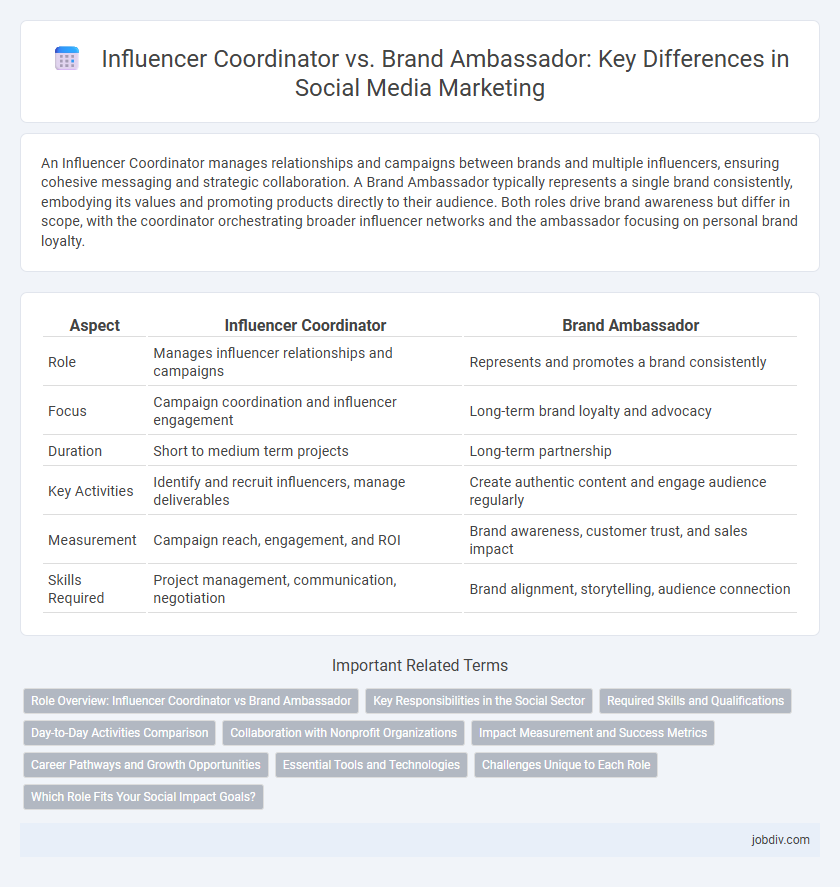An Influencer Coordinator manages relationships and campaigns between brands and multiple influencers, ensuring cohesive messaging and strategic collaboration. A Brand Ambassador typically represents a single brand consistently, embodying its values and promoting products directly to their audience. Both roles drive brand awareness but differ in scope, with the coordinator orchestrating broader influencer networks and the ambassador focusing on personal brand loyalty.
Table of Comparison
| Aspect | Influencer Coordinator | Brand Ambassador |
|---|---|---|
| Role | Manages influencer relationships and campaigns | Represents and promotes a brand consistently |
| Focus | Campaign coordination and influencer engagement | Long-term brand loyalty and advocacy |
| Duration | Short to medium term projects | Long-term partnership |
| Key Activities | Identify and recruit influencers, manage deliverables | Create authentic content and engage audience regularly |
| Measurement | Campaign reach, engagement, and ROI | Brand awareness, customer trust, and sales impact |
| Skills Required | Project management, communication, negotiation | Brand alignment, storytelling, audience connection |
Role Overview: Influencer Coordinator vs Brand Ambassador
An Influencer Coordinator manages relationships between brands and multiple influencers, focusing on campaign strategy, content scheduling, and performance tracking to maximize reach and engagement. A Brand Ambassador, by contrast, represents a single brand authentically, embodying its values and driving loyalty through consistent promotion and personal endorsement. While the Influencer Coordinator orchestrates influencer collaborations, the Brand Ambassador builds long-term trust and brand affinity with the audience.
Key Responsibilities in the Social Sector
Influencer Coordinators manage relationships with multiple influencers, overseeing campaign strategy, content scheduling, and performance tracking to ensure brand alignment and audience engagement. Brand Ambassadors focus on representing and promoting a single brand authentically, embodying its values to build trust and drive long-term customer loyalty through personal interaction and community involvement. Both roles require strong communication skills, but Influencer Coordinators emphasize coordination and analytics, while Brand Ambassadors prioritize brand representation and advocacy.
Required Skills and Qualifications
Influencer Coordinators require strong project management skills, social media analytics expertise, and excellent communication abilities to effectively liaise between brands and influencers. Brand Ambassadors must possess deep brand knowledge, authentic engagement skills, and a persuasive personality to genuinely promote products and foster trust among target audiences. Both roles demand adaptability, creativity, and a thorough understanding of digital marketing trends to drive meaningful social media impact.
Day-to-Day Activities Comparison
Influencer Coordinators manage daily communication, campaign scheduling, and performance tracking to ensure smooth collaboration between brands and influencers. Brand Ambassadors engage continuously with their audience by promoting products through content creation, responding to followers, and embodying the brand's image in real-time interactions. While Coordinators focus on strategic planning and logistics, Ambassadors prioritize personal engagement and authentic representation.
Collaboration with Nonprofit Organizations
Influencer coordinators strategically manage partnerships between brands and nonprofit organizations, ensuring alignment with social impact goals and maximizing campaign effectiveness. Brand ambassadors personally represent a brand's values and actively engage their audience in supporting nonprofit causes, driving authentic connections and community involvement. Collaboration with nonprofits enhances brand reputation and social responsibility, leveraging both coordinators' organizational skills and ambassadors' genuine influence.
Impact Measurement and Success Metrics
Influencer Coordinators focus on tracking engagement rates, conversion metrics, and content reach to evaluate campaign effectiveness, using tools like impression analytics and click-through rates. Brand Ambassadors emphasize long-term brand loyalty, measuring impact through customer retention, sentiment analysis, and brand advocacy growth. Both roles prioritize ROI, but Influencer Coordinators lean towards immediate performance indicators while Brand Ambassadors assess sustained brand influence over time.
Career Pathways and Growth Opportunities
Influencer Coordinators manage campaigns and relationships, honing skills in project management and digital marketing, making this role ideal for those seeking rapid growth within influencer networks and strategic brand partnerships. Brand Ambassadors focus on authentic representation and deep brand integration, offering career opportunities that emphasize personal branding, public relations, and long-term influencer status. Both roles provide distinct pathways, with Influencer Coordinators often advancing into marketing managerial positions, while Brand Ambassadors may evolve into niche influencers or brand strategists.
Essential Tools and Technologies
Influencer Coordinators utilize advanced project management platforms such as Asana and Trello to streamline campaign logistics and communication, while Brand Ambassadors often rely on social media analytics tools like Hootsuite and Sprout Social to track engagement and optimize content performance. Essential tools for Influencer Coordinators include CRM systems and influencer marketing platforms like AspireIQ, enabling efficient influencer recruitment and relationship management. Brand Ambassadors benefit from content creation technologies such as Canva and Adobe Spark, allowing them to produce visually compelling promotional materials aligned with brand messaging.
Challenges Unique to Each Role
Influencer Coordinators face challenges in managing diverse talent schedules and aligning campaign goals across multiple platforms, requiring advanced project management and negotiation skills. Brand Ambassadors encounter difficulties maintaining authentic brand representation and consistent engagement with target audiences while embodying the brand's values in everyday interactions. Both roles demand strategic communication but differ in execution, where coordinators optimize influencer partnerships and ambassadors deepen brand loyalty through personal outreach.
Which Role Fits Your Social Impact Goals?
Choosing between an Influencer Coordinator and a Brand Ambassador depends on your social impact goals and desired level of engagement. Influencer Coordinators strategically manage multiple influencers to amplify brand messaging across diverse audiences, maximizing reach and campaign efficiency. Brand Ambassadors embody your organization's values authentically, fostering deeper trust and long-term relationships that align closely with social impact initiatives.
Influencer Coordinator vs Brand Ambassador Infographic

 jobdiv.com
jobdiv.com